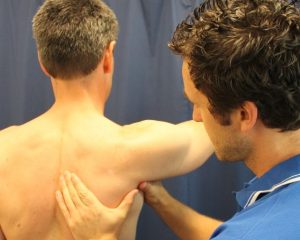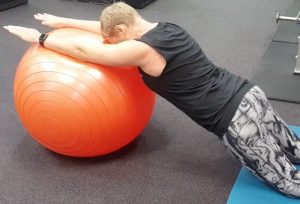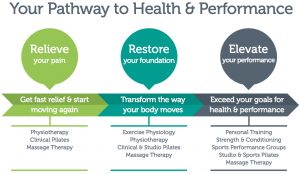So what actually is the difference between Physiotherapy, Exercise Physiology and Personal Training?
At Central Performance our physiotherapists, exercise physiologists & personal trainers all work side-by-side to care for our clients. Our aim is to perfectly match our clients with the right program whatever their level of physical health, injury & performance. The flowchart below shows how it all fits together.
3 questions we often get asked by clients are;
1. What does an exercise physiologist do?
2. How is exercise physiology different from physiotherapy?
3. How is exercise physiology different from personal training?
Firstly, exercise physiologists use exercise to treat chronic health conditions. The most common types of problems that our exercise physiologists treat are;
• Musculoskeletal Injuries, eg back & neck pain, osteoarthritis, sports injuries/sprains & strains, post-operative recovery like ACL knee reconstruction, shoulder & knee problems
• Cardiovascular & metabolic problems, eg high blood pressure (hypertension), heart problems, to reduce bad cholesterol (LDL & total) & increase good (HDL) cholesterol, & diabetes management
• Mental health, eg depression & anxiety
Similar to how a doctor prescribes medicine, exercise physiologists prescribe exercise programs. When deciding on the correct program to prescribe they consider a range of factors about the client’s condition, any other unrelated conditions, previous injuries or health problems, & the client’s previous exercise experience. For example, a young male who presents with 6 months of back pain but no other injuries or medical conditions will receive a different ‘dose’ of exercise to a post-menopausal woman with a 10 year history of back pain who also has hypertension (high blood pressure). The goal is to match the client with the right type & amount of exercise, as well as to make the exercise interesting so that the client is much more likely to be consistent in their sessions.

The second difference is that physiotherapists are able to diagnose injuries & order some types of medical imaging, whilst exercise physiologists are not. If someone presents to a physio with a ‘tweaked’ hamstring after football on the weekend a physio is able to diagnose if they have a hamstring strain & what grade the hamstring strain is. By contrast an exercise physiologist isn’t allowed to give a client a diagnosis in that fashion & this is linked to exercise physiologists specialising in chronic health conditions rather than acute injuries. Similarly, physiotherapists can refer clients for some investigations such as x-rays while an exercise physiologist can’t.
Thirdly, exercise physiologists receive extensive training & education in the physiology of metabolic & cardiovascular health conditions. This gives them the skills & expertise necessary to prescribe exercise for people suffering from metabolic & cardiovascular health conditions. Physiotherapists don’t receive training to the same level in these conditions unless they have a special interest in them & pursue further study.

Personal trainers do not receive such extensive education or training in physiology, biochemistry or pathology to treat chronic health conditions. As a result they are not eligible for private health fund rebates or referrals from GPs under the Chronic Disease Management plan. Exercise physiologists however are eligible for private health fund rebates & most health insurers cover exercise physiology. Similarly, MediCare will also provide rebates for exercise physiology when referred by a GP under the Chronic Disease Management plan.
Exercise physiology rather than personal training may also be suitable for people who have no experience with exercise or gyms. Because exercise physiologists primarily treat people with chronic health conditions they receive training in cognitive behavioural approaches to help clients feel comfortable & confident while exercising. A similar cognitive behavioural approach can benefit those who have little to no experience with exercise & are therefore nervous to start exercise.
As you can see physiotherapy, exercise physiology & personal training all have different areas of specialisation. At Central Performance we believe in integrating all three in our multidisciplinary approach to provide you with a perfect pathway from pain to full performance, whatever your goals may be. For example a back pain client may initially see our physio’s for diagnosis & hands-on treatment to settle their pain & return to gentle movement. Then they may progress to exercise physiology for initial correction of movement biomechanics plus a return of baseline stability & strength. Once this is achieved they can progress to personal training to really build their strength & endurance, or train to achieve any other sporting or health goals they have.
Contact Us for More Info: For more information or help deciding which service would be the best for you to start, please contact us on +61 2 9280 2322 or via email. There is also lots more information on the webpage for each of the services – see physiotherapy, exercise physiology or personal training.


